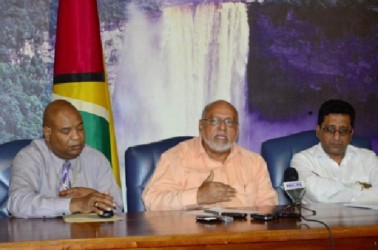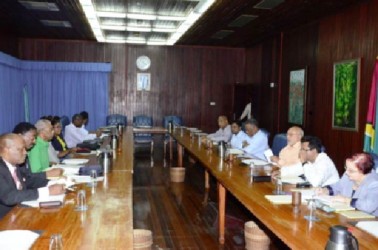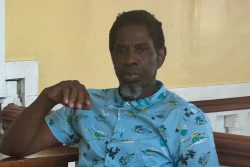Despite months of wrangling, negotiations between the government and the opposition over the anti-money laundering bill will go down to the wire today with the Chief Parliamentary Counsel to draft several APNU amendments to enable passage of the bill in Parliament in the backdrop of a Friday deadline that threatens severe financial repercussions.
President Donald Ramotar and A Partnership for National Unity (APNU) called acrimony-filled press conferences yesterday to argue their case to the public prior to an afternoon meeting of the Select Committee of Parliament on the bill. Last night, the committee meeting ended with the expectation that long-awaited amendments by APNU would be drafted into legislative language for a final showdown this afternoon on whether the bill will be passed.

Last evening, APNU representatives on the Anti-Money Laundering/ Countering the Financing of Terrorism (AML/CFT) special select committee confirmed that the Chief Parliamentary Counsel (CPC) had not finished drafting the amendments.
“The Chief Parliamen-tary Counsel [Cecil Dhurjon] has not finished, the questions that he had raised, that he claims that he needed clarified so he could conclude and the questions as to whether or not we were sure as to what we wanted have been clarified. We have explained to him with clarity…he has what he needs in order to draft”, APNU’s point man on the bill, Carl Greenidge stated last evening.
He confirmed after the conclusion of the special select committee to deal with the contentious legislation, that Dhurjon could be ready with the drafts by 11 am today. Greenidge stated that the select committee will meet again at that point, but that it is not yet known if the committee will be finished its work for the bill to be brought back to the National Assembly for its 2 pm meeting.

Speaking as the government’s spokesperson on the committee yesterday, Attorney General and Minister of Legal Affairs Anil Nandlall stated that “the CPC has expressed apprehension and uncertainty as to whether that huge task can be completed from now to 11 tomorrow morning… I don’t know, we are waiting to see whether the CPC can condense that which has been explained to him of the APNU’s proposals into palatable form in the form of a bill for presentation tomorrow at 11.”
Nandlall spoke without optimism. He noted that APNU had finally given assistance to the CPC in dealing with clarifications.
Meanwhile, at a press conference held by APNU earlier in the afternoon, executive member Joseph Harmon stated that the proceedings by the CPC are often prolonged by influence. He said “Mr Dhurjon’s office is located with that of the attorney general. He is the chief parliamentary counsel, he is meant to be servicing the parliament…but the attorney general has made it clear on more than one occasion that the chief parliamentary counsel is the chief legislative draft person as well and he has a lot of work for the gentleman to do…that type of influence is exercised over the work of the chief parliamentary counsel.”
Harmon stated that in a meeting held yesterday morning with the president, the members of the opposition presented a common front. “There was a joint list so there was no separation between what the AFC wants and what the APNU wants because they are all linked”. He stated that for the Bill to be passed at the parliamentary level the government will need to pass the amendments to the principal Act that APNU wants; the president will need to assent to four outstanding bills including the local government bill; have the local government bills that were assented to operationalised and establish the Public Procurement Commission (PPC).
Position we left with
He said that “that is the position we took and that is the position we left with.” Originally the AFC had only been pushing for the PPC but it has changed its position to also demand the items that APNU was seeking. The shift has denied the government the option of striking a deal only with the AFC.
Meanwhile, President Ramotar at his press conference prior to the meeting of the select committee said “I told the opposition parties this morning that we have a bill that we know that we are told that is in compliance with the standard with the CFATF (Caribbean Financial Action Task Force) and FATF (Financial Action Task Force). I said to them let us pass this bill so we can put our country beyond problems and jeopardy that exist and the consequences that can come from being blacklisted. I reiterated my readiness to establish the joint committee to look at the bills that I have not assented to.”
He charged that APNU and the AFC were dealing with “blackmail-type politics” and that he could not just assent to the four outstanding bills which he knew to be unconstitutional. Ramotar stated that the opposition had the majority in parliament and they could bring back motions to the house for further amendments to the AML/CFT bill. He added that “I am giving my public commitment that I will sign that. I will assent to the bill.” A large number of motions have been approved by the opposition in this parliament but have been ignored by the government.
Ramotar stated that APNU and the AFC had an obligation to allow the passage of the AML/CFT bill. He stated that with the AFC he was ready to work towards establishing the PPC but that the government’s no-objection power on state contracts must be preserved.
When asked by Stabroek News if the government was considering the proposals made by the AFC to remove the government’s no-objection clause and instead allow the government to act in the capacity of stakeholder, he stated that that was not possible. Ramotar noted that if the government had to accept supreme responsibility and answer to questions in relation to contracts being awarded unjustly, then it was the government who would need the final say.
He said that the AFC had “sprung” their proposals earlier yesterday on the government. However the AFC had published these proposals since last week.
The Attorney General, Anil Nandlall, noted that “we are planning to go to the parliament to pass the bill we have said to the AFC that we are prepared to give you the procurement commission for tomorrow.”
He then clarified this and said “We are prepared to do everything that can be done between today and tomorrow, all things being equal so that you can have the procurement commission as far as possible, that which can be accomplished by tomorrow morning.”
Deaf ears
The attorney general’s promises, along with the president’s, will likely fall on deaf ears as Leader of the AFC, Khemraj Ramjattan told Stabroek News that this was no longer the time for promises but action. Yesterday, after the adjournment of the special select committee, Ramjattan stated that for twelve years the PPC has not been established and that the president giving his word meant very little.
Ramjattan stated that the AFC’s and the APNU’s decision to hold a common line with the government stemmed from their recognition that each party would need the other to get more accomplished in the national assembly in the future.
During his press conference, Ramotar pronounced that he was not aware of any country within the Caribbean region that has had successful prosecutions of anti-money launderers.
“The whole region is deficient as far as implementation is concerned”, he said.
He called for a comparative analysis of other countries within the region. Nandlall stated that APNU’s proposed amendments could potentially change the compliant model.
He stated that the amendments could potentially change the structure of the Financial Intelligence Unit. He noted that that “you’re changing the model of the FIU if you change the model of the FIU then you are interfering with and then you are liable to be in contravention of foundational principals of the FIU, for example autonomy, independence, conflict of interest…”
The attorney general continued that corrupting the FIU model could interfere with the political process and that violations of CFATF guidelines could mean further ramifications with the drafting of the proposals.
Nandlall stated that Guyana’s weakness was not in implementing the legislative component of the CFATF requirements but in the non-legislative enforcement policies. He stated that with the establishment of a National Task Force, the government was working to connect all relevant institutions.
He continued that the guidelines have already been established and that the CFATF would be pleased with the enforcement regulations implemented during the next round of reviews by the CFATF and ultimately the FATF.
Financial Advisor to the CFATF Roger Hernandez had previously told Stabroek News that enforcement of legislation was ultimately the most important aspect in fighting money launderers. He noted that while Guyana was currently on the public sanctions list only if Guyana showcased real improvement in enforcement of legislation would Guyana be moved from the list.
Guyana was given a deadline of February 28, 2014 to pass the bill or face continued public sanctions regionally by the CFATF. The CFATF blacklisting was applied in November last year and the next step could see more stringent repercussions. A series of other deadlines has been missed by Guyana.
The Private Sector Commission has been imploring the two sides to reach an agreement soon.








